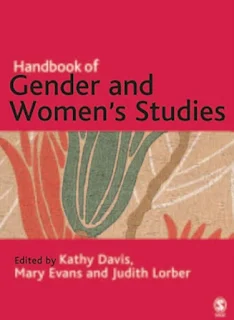 |
| Handbook of Gender and Women Studies |
DESCRIPTION:
Gender and Women's Studies
(GWS) is a multifaceted and dynamic academic discipline that delves deep into
the complex issues of gender identity, gender roles, and the experiences of
women. This field of study, also referred to as Women's and Gender Studies,
emerged in response to the growing need to critically analyze, understand, and
transform gender-related inequalities and injustices. Over the years, GWS has
evolved into an interdisciplinary area of scholarship, addressing a vast array
of topics from historical perspectives and societal constructs to contemporary
gender issues and activism. In this comprehensive exploration, we will delve
into the foundations, key concepts, evolving paradigms, and the continued
relevance of Gender and Women's Studies.
The Foundation of
Gender and Women's Studies:
Gender and Women's Studies has
its roots in the feminist movement of the 1960s and 1970s. This movement sought
to address the systemic discrimination and oppression faced by women in various
aspects of life, including education, employment, and personal autonomy.
Feminists began to challenge traditional norms and societal expectations,
advocating for women's rights, opportunities, and equality.
As a result of this activism,
academic institutions started offering courses that examined women's roles and
issues from an academic perspective. These courses later evolved into degree
programs and departments dedicated to the interdisciplinary study of gender,
sex, and sexuality.
Key Concepts in Gender
and Women's Studies:
Intersectionality: One
of the foundational concepts in GWS is intersectionality, which was introduced
by Kimberlé Crenshaw. It recognizes that individuals are shaped by multiple
intersecting identities, including but not limited to gender, race, class,
sexuality, and ability. These intersecting identities create unique experiences
and challenges that cannot be understood by examining gender in isolation.
Feminism:
Feminism, another core concept, is a social and political movement advocating
for the rights and equality of women. GWS engages with various waves of
feminism, each addressing different aspects of women's oppression and
discrimination.
Patriarchy: This
concept refers to a social system in which men hold primary power and dominate
in roles of leadership and authority. GWS critically analyzes how patriarchy
operates and the impact it has on individuals and societies.
Gender
Identity and Expression: GWS explores the complexity of gender
identity and expression. It considers how individuals identify and express
their gender, whether or not it aligns with the sex assigned to them at birth.
This area includes discussions on transgender studies and non-binary
identities.
Sexuality
and Sexual Orientation: GWS addresses various aspects of
sexuality, including sexual orientation and identity. It also examines the
intersections of gender and sexuality, often engaging with LGBTQ+ issues.
Masculinities:
While GWS is often associated with the study of women, it also examines the
diverse ways in which masculinities are constructed and performed. Toxic
masculinity and the impact of gender norms on men's lives are significant
topics.
Reproductive
Rights: GWS critically analyzes reproductive rights, including
issues related to abortion, birth control, and access to healthcare. It
explores the impact of reproductive policies on women's autonomy and
well-being.
Global
Perspectives: Gender and Women's Studies takes a global
approach, examining how gender issues are experienced and addressed in
different cultures and regions. It seeks to understand the diversity of women's
experiences worldwide.
Evolving Paradigms in
Gender and Women's Studies:
Gender and Women's Studies has
evolved significantly since its inception. It has expanded to encompass a
broader range of topics and paradigms, such as:
Queer
Theory: This perspective challenges binary notions of gender and
sexuality, seeking to understand how people express their identities beyond
traditional categories.
Postcolonial
Feminism: Examines the intersection of gender and colonialism,
highlighting how colonialism has shaped and continues to influence gender
dynamics in postcolonial societies.
Transnational
Feminism: Focuses on the interconnectedness of global issues,
acknowledging that women's rights and gender equality are global concerns that
require transnational cooperation and activism.
Cyberfeminism:
Addresses the impact of the internet and digital technologies on gender issues,
including online harassment, identity exploration, and activism through digital
platforms.
Ecofeminism:
Examines the links between environmental issues and gender, emphasizing that
the exploitation of nature is intertwined with the subjugation of women.
The Relevance of Gender
and Women's Studies:
Gender and Women's Studies
remains highly relevant today. It contributes to our understanding of the
social, economic, political, and cultural dimensions of gender, helping to
challenge and dismantle deeply ingrained biases and inequalities. Its significance
can be seen in various contexts:
Social
Justice: GWS is at the forefront of social justice movements,
advocating for equal rights, representation, and opportunities for all genders.
Policy
and Legislation: It informs policies related to gender
equality, reproductive rights, and anti-discrimination.
Health
and Healthcare: GWS research plays a crucial role in
understanding women's health and advocating for better healthcare access.
Education: GWS
encourages educational institutions to adopt inclusive and diverse curricula
and to address issues like sexual harassment on campuses.
Media
and Representation: It promotes critical analysis of media
portrayals and representation of gender, challenging stereotypes and biases.
Conclusion:
Gender and Women's Studies is
a vital and evolving field of study that has a profound impact on society. It
empowers individuals to critically analyze the complex and multifaceted nature
of gender and provides a framework for advocating for gender equality and
social justice. As it continues to grow and adapt, GWS remains at the forefront
of the ongoing struggle for gender equity and a more inclusive, just world.
